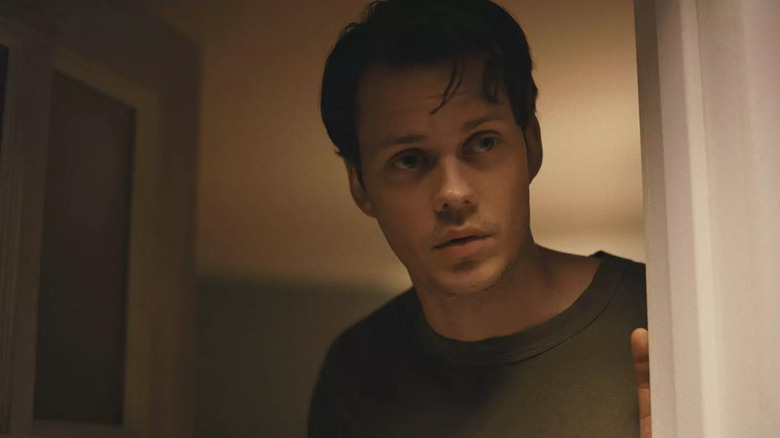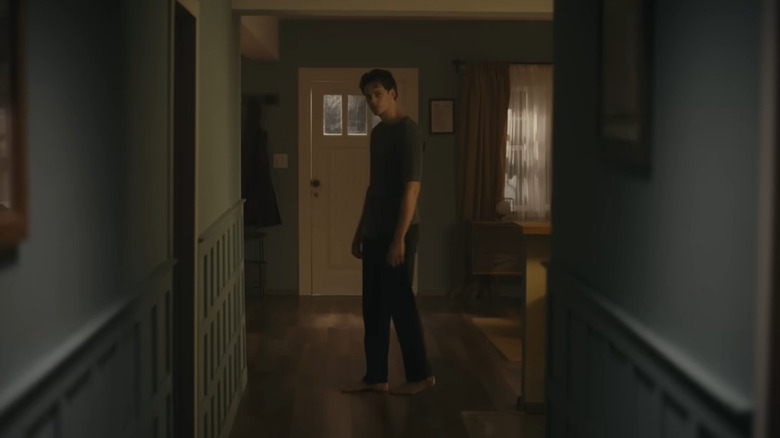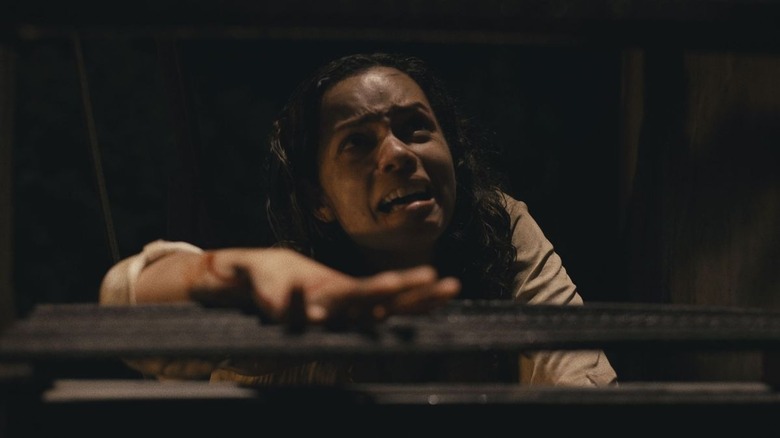How Barbarian Brilliantly Utilizes Bill Skarsgård's Role In Stephen King's It
This article contains major spoilers for "Barbarian."
One of the most audacious horror films in recent years, "Barbarian" cleverly uses Bill Skarsgård's filmography to subvert audience expectations. He plays Keith, a mysterious tenant in an AirBnB that has been double booked. When Tess arrives at the same rental in the middle of the night, she is unsettled by this additional occupant. During the nerve-racking first act where Keith invites Tess inside to figure out the mix-up, writer and director Zach Cregger toys with the viewer's suspicions that he has sinister intentions.
Tess remains on guard while Keith tries to console and shelter her from the dangerous neighborhood and turbulent storm. Any woman would feel uncomfortable in the situation of being alone in a house with a male stranger and Tess takes all the necessary precautions: she refuses to drink the cup of tea he poured when she wasn't looking, she hesitates to share a bottle of wine with him — even as he awkwardly promises to open it in front of her — and she always locks the door behind her. The more Keith is nice and clumsily tries to reassure her that she can trust him, the more threatening he seems.
"Do I look like some kind of monster?" Keith asks, an unintentional joke that nods to Skarsgård's famous role as Pennywise in Stephen King's 'It." Skarsgård's casting in a horror film immediately makes you think of his turn as the demonic clown. A big reason the actor fits in the horror genre so well is his uncanny features: his saucer-like eyes and curled lips. Cregger's line combined with Skarsgård's natural mystique greatly impacts how we view his character in "Barbarian."
An unintentional Pennywise joke
That line of dialogue in conjunction with Bill Skarsgård's casting seems so ideal that it must have been intentional, but Cregger says otherwise in an interview with CinemaBlend:
"I actually didn't think of that as a joke until the first time we screened it for an audience and everyone laughed, I was like, 'Oh yeah, I guess that is pretty funny'. I mean, Bill was perfect casting for this because he has such a history with the audience, horror audiences know him, you know, and they expect something from him. So as soon as he opens that door, everyone's like, 'Oh!!' You know? And that's just what you want."
The reference to Skarsgård's role in "It" is a welcome comedic moment of respite in an incredibly tense scene. It also heightens the audience's skepticism of Keith. Like Tess, we are wary of his character the entire time, even when he seems genuinely friendly. As a viewer, you are constantly on edge, waiting for the reveal that Keith lured her into the house for malicious reasons. Even when Keith emerges terrified from the dark tunnels beneath the house, you are still doubtful.
Keith's inherent creepiness amplifies the impact of the twist when the mysterious creature shows herself and slams his head against the wall in a gory furor. Only then do we finally realize that Keith has been set up to be a villain. This surprise shakes the entire foundation of the film. Now anything can happen.
Misogyny is the real monster
Skarsgård's casting also plays into the film's larger themes. "Barbarian" interrogates why women feel unsafe in a world of toxic masculinity. Some men are like how we first perceive Keith: bumbling, considerate, and nice on the surface, but you still second guess whether or not there's a manipulative hidden agenda. There are so many men that would put drugs in that cup of tea or bottle of wine that women find it difficult to recognize or trust someone who wouldn't. Bill Skarsgård throws the audience off because his performance is affable, yet our knowledge of his past roles in the horror genre make us distrust him. His casting allows the audience to identify with women's constant uncertainty.
Other men are more like Justin Long's character AJ, an arrogant gaslighter and rapist seeped in male privilege who still believes he is a good person. Unfortunately, some are like Frank, the sociopathic father of the Mother creature and abductor of dozens of other women. There are varying degrees of misogyny, but all of them are dangerous and potentially deadly.


